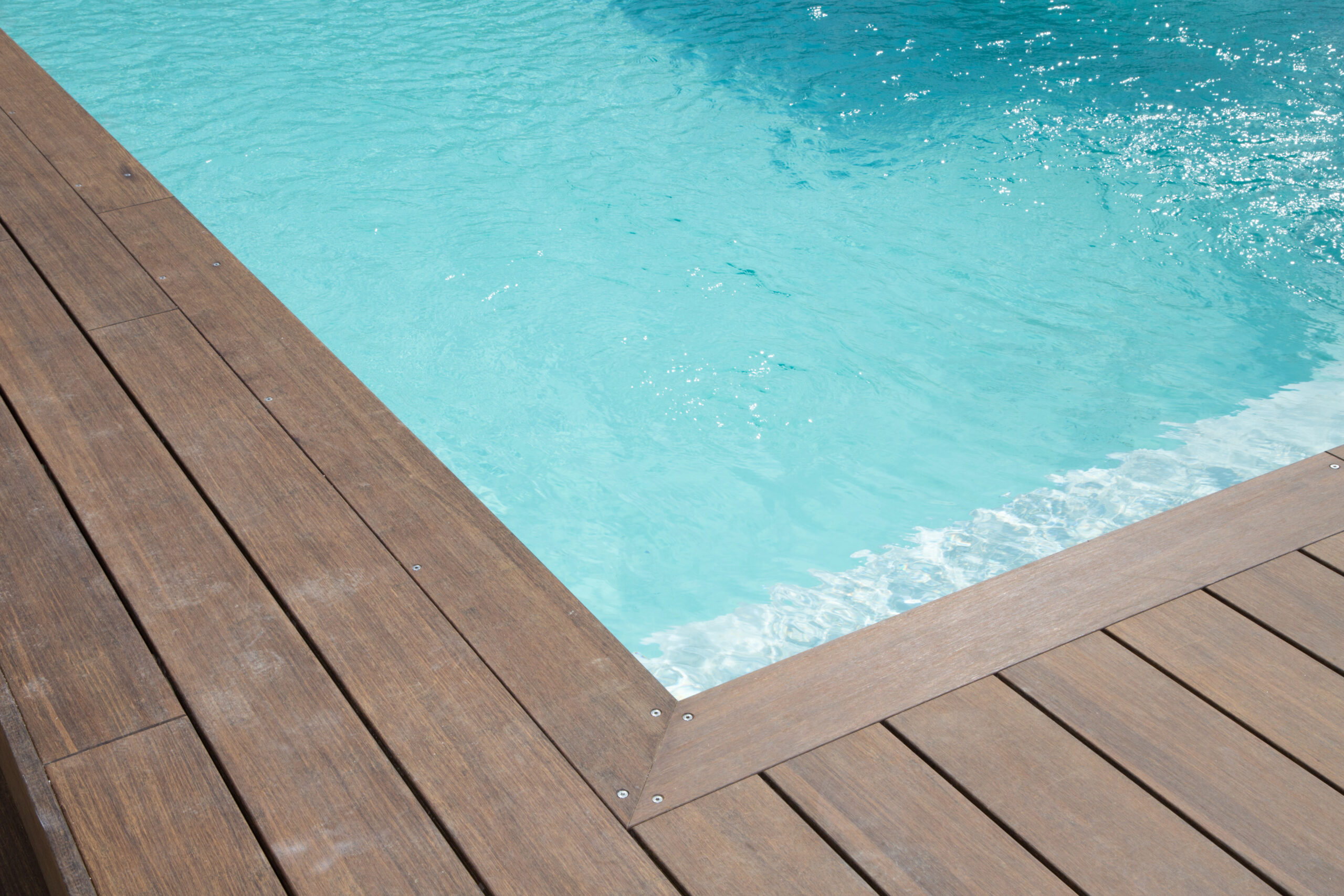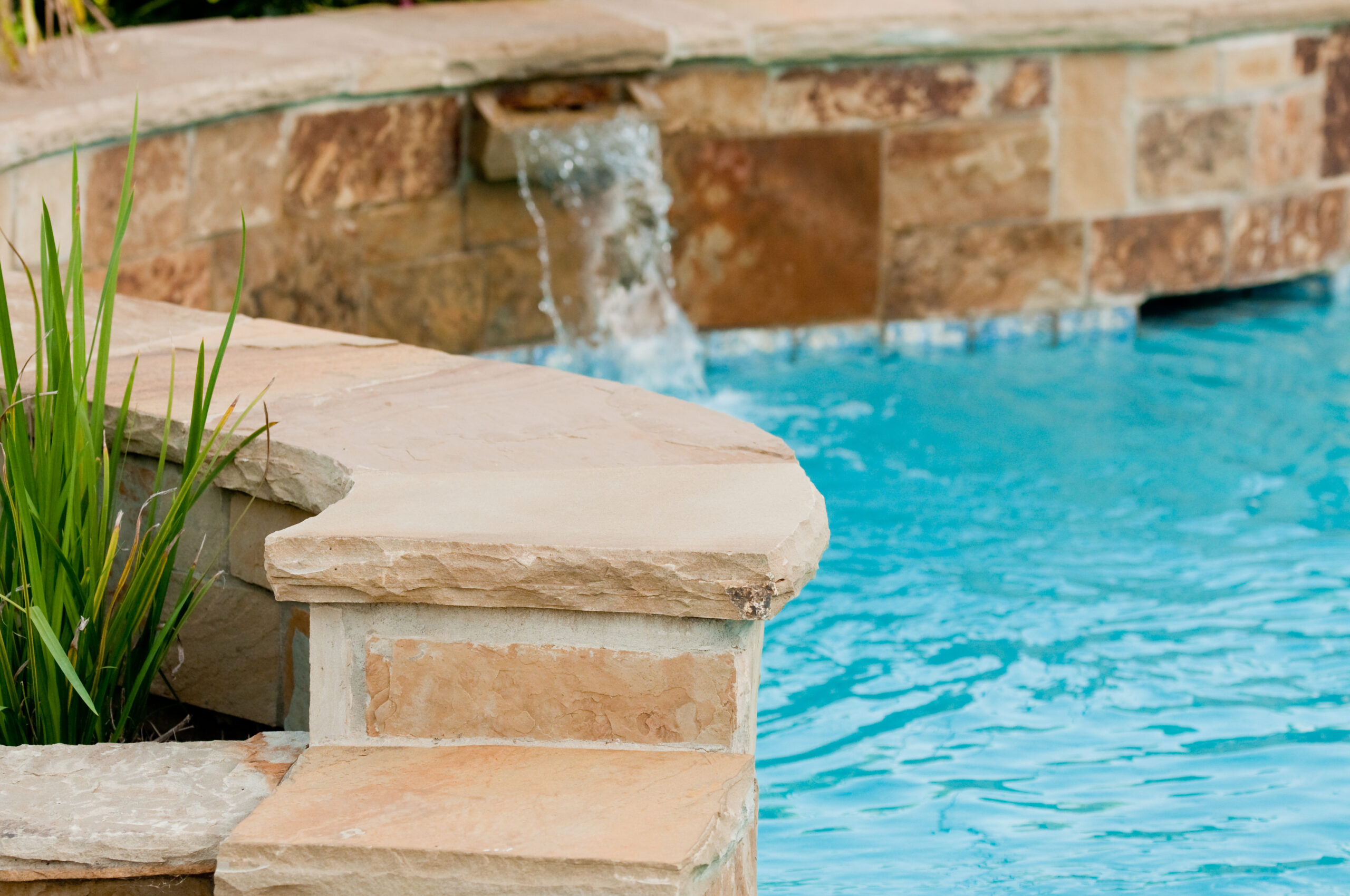Introduction

Choosing between a salt water pool versus a chlorine pool can be challenging, especially when considering long-term maintenance, costs, and overall swimming experience. As technology advances in 2025, more homeowners are exploring the benefits and drawbacks of each system before making a decision. At Loomis Pools, we understand how important it is to choose the right pool system that enhances your outdoor living space while meeting your lifestyle needs.
How Do Salt Water and Chlorine Pools Work?
Salt Water Pool System
A salt water pool generates chlorine naturally using a process called electrolysis. A salt chlorine generator converts dissolved salt into chlorine, keeping the pool sanitized without requiring traditional chlorine tablets or liquid chlorine. This system maintains a steady level of chlorine, reducing the need for frequent chemical adjustments.
Chlorine Pool System
A traditional chlorine pool relies on manually added chlorine in the form of tablets, granules, or liquid. This chlorine kills bacteria, algae, and microorganisms but requires regular monitoring to maintain the correct chemical balance.
Pros and Cons of Salt Water Pools
Advantages of a Salt Water Pool
- Gentler on Skin and Eyes: Salt water pools have lower chlorine levels, making them less harsh on the skin and eyes compared to traditional pools.
- Lower Chemical Maintenance: Once the salt system is set up, it requires less manual chemical adjustment, making pool upkeep easier.
- Softer Water Feel: Many swimmers prefer the natural, softer feel of salt water pools compared to the sharper chlorine-based pools.
- Fewer Harsh Chemical Smells: Because chlorine is generated consistently, the strong chemical odor common with chlorine pools is reduced.
- Long-Term Cost Savings: While the upfront cost is higher, salt water pools often have lower maintenance and chemical costs over time.
Disadvantages of a Salt Water Pool
- Higher Initial Cost: Installing a salt chlorine generator can be expensive compared to setting up a traditional chlorine pool.
- Corrosion Potential: Salt can accelerate the corrosion of certain pool components, including metal fixtures and nearby decking materials.
- More Complex Repairs: Salt water pool equipment, including the generator, can be expensive to repair or replace if it malfunctions.
Pros and Cons of Chlorine Pools
Advantages of a Chlorine Pool
- Lower Initial Cost: Installing a chlorine pool requires a smaller initial investment compared to a salt water system.
- Effective at Killing Bacteria: Chlorine pools are highly effective in maintaining a sanitary swimming environment.
- Easier Repairs: Since chlorine pools use standard components, repairs and replacements tend to be simpler and more affordable.
- No Risk of Corrosion Due to Salt: Unlike salt water pools, chlorine pools do not contribute to premature corrosion of pool parts or surrounding structures.
Disadvantages of a Chlorine Pool
- More Frequent Chemical Adjustments: Chlorine levels need to be monitored and adjusted regularly to maintain water quality.
- Skin and Eye Irritation: Higher chlorine levels can cause skin and eye irritation for swimmers, especially those with sensitive skin.
- Strong Chemical Smell: Chlorine pools often have a noticeable chemical odor, particularly when chlorine levels fluctuate.
Cost Comparison: Salt Water vs. Chlorine Pools
When considering a salt water pool versus chlorine pool, cost is a major factor for most homeowners.
Installation Costs
- Salt Water Pool: The initial setup cost is between $1,500 and $2,500 for the salt chlorine generator, on top of the regular pool installation cost.
- Chlorine Pool: The initial installation is typically lower, as there is no need for a chlorine generator.
Ongoing Maintenance Costs
- Salt Water Pool: Requires occasional salt addition and periodic equipment maintenance, but chemical costs are generally lower.
- Chlorine Pool: Requires regular chemical purchases, testing kits, and potential shock treatments, leading to higher long-term costs.
Maintenance Differences
Managing a Salt Water Pool
Salt water pools require less daily maintenance but still need regular upkeep:
- Monitoring the salt chlorine generator to ensure proper function.
- Checking salt levels and adding salt as needed.
- Inspecting the pool for signs of corrosion and cleaning filters periodically.
Managing a Chlorine Pool
A chlorine pool requires more frequent monitoring:
- Testing and adjusting chlorine levels several times a week.
- Adding chlorine tablets or liquid to maintain the right balance.
- Shocking the pool as needed to prevent algae growth.
Which Pool Type Lasts Longer?
Both salt water and chlorine pools can last for many years with proper care. However, salt water pools may lead to faster wear on certain pool components due to corrosion. Choosing durable, salt-resistant materials can help extend the lifespan of a salt water pool. With expert installation from Loomis Pools, both types of pools can be set up for long-term durability.
Environmental Impact of Salt Water vs. Chlorine Pools
When thinking about eco-friendliness, salt water pools have a slight advantage:
Salt Water Pools
- Require fewer harsh chemicals, leading to reduced chemical runoff.
- Less frequent need for chemical disposal.
- Generally considered a more sustainable option for long-term pool maintenance.
Chlorine Pools
- Require regular use of chemicals, which may have environmental consequences if not handled properly.
- Produce more chemical waste from packaging and residual chemical buildup.
Which Pool Type Is Best for Homes in 2025?
Your decision should be based on your budget, maintenance preference, and personal swimming experience. If you prefer a pool with lower chemical use and a softer water feel, a salt water pool may be the best choice. On the other hand, if you're looking for a lower up-front investment with straightforward maintenance, a chlorine pool might be better suited for your needs.
Why Choose Loomis Pools for Your Pool Installation?
Loomis Pools specializes in designing and installing both salt water and traditional chlorine pools. Our expert team ensures that your pool is tailored to your preferences, using high-quality materials and modern technology. Whether you're looking for a custom pool installation, custom hardscape design, or premium hot tub installation, Loomis Pools is committed to transforming outdoor spaces into personal retreats.
Conclusion
The choice between a salt water pool versus chlorine pool ultimately depends on your lifestyle and maintenance commitment. Both options have their own benefits and considerations. To ensure you make the best decision for your home in 2025, consulting professional pool installers like Loomis Pools can help guide you through the process. Contact us today to explore your perfect pool setup and start creating your dream outdoor space.



